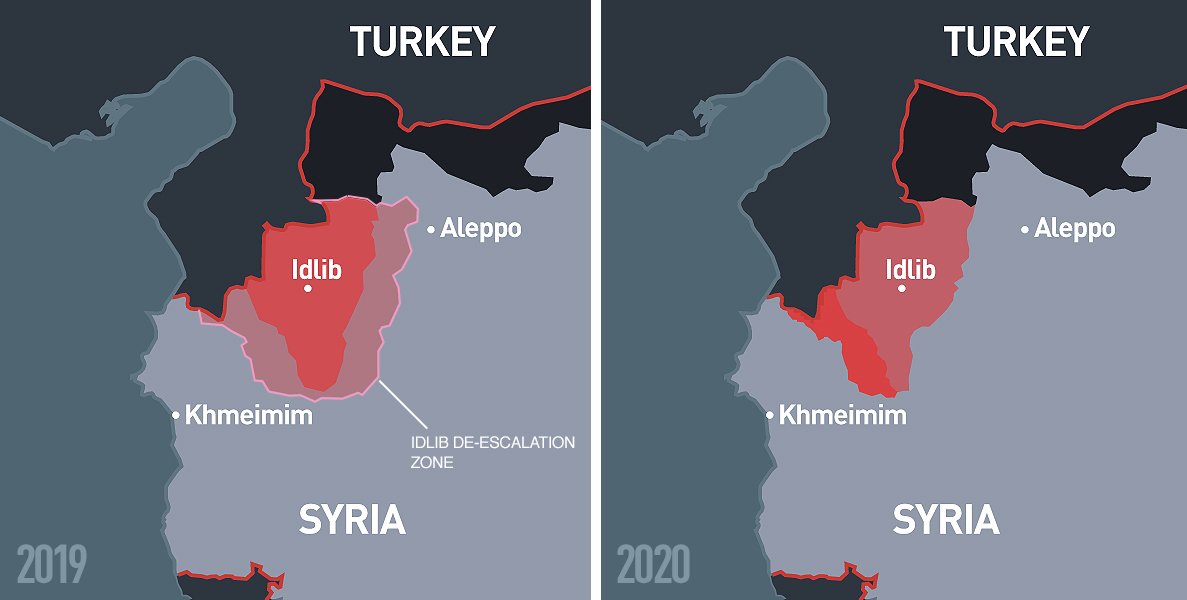Turkey & Syria on brink of WAR in Idlib: How did it come to this?
Alarming developments in Syria’s Idlib saw dozens of Turkish soldiers killed in a Syrian airstrike and Ankara responding with own fire and fury. But anyone following the conflict would know the escalation didn’t start overnight.
The Idlib governorate, located in the northwestern part of Syria on the border with Turkey, is the last major stronghold of armed groups that have been fighting to topple the government of Syrian President Bashar Assad for the past several years. The region was spared a Syrian Army offensive in 2018 on a request from Turkey, which said it didn’t want to face a new influx of refugees from Syria after already taking in some 3.6 million people.
Who is fighting who
Many of the fighters in Idlib came from elsewhere. Some are foreign mercenaries, who arrived in Syria to join various jihadi groups funded by countries like Qatar and Saudi Arabia and didn’t leave the country after Russian military intervention turned the tide of battle in favor of Damascus. Others are Syrians, who were part of anti-government forces in liberated hotspots like Aleppo or Douma, and were granted safe passage to Idlib.
Also on rt.com Even NATO is unwilling to touch Turkey’s Idlib mess with a ten-foot poleTurkey, which was among the supporters of anti-Assad fighters, has a sway among some of the armed groups in Idlib. Others, like Hayat Tahrir al-Sham (HTS) — the major Syrian jihadist faction formerly pledging allegiance to Al Qaeda — are considered terrorists by Ankara. In reality, the extremists occasionally fight alongside the Turkey-backed groups against the approaching Syria armed forces and their allies.
What ceasefire deal said
The September 2018 deal between Turkey and Russia established a path towards de-escalation of violence in Idlib. A demilitarized zone (DMZ) within the militant-held area was agreed, and terrorist groups including HTS were to leave this buffer zone entirely, while the so-called “moderate” rebels only had to pull back heavy weaponry.
Damascus agreed to stop the offensive, while Ankara was supposed to use its influence in the Syrian province to convince more independent groups to observe a ceasefire, and eventually bring a lasting cessation of hostilities.
A chain of observation posts was established by Turkey to monitor the situation on the ground. Groups rejecting the plan and perpetrating violence would remain a legitimate target for the Syrian military.
Also on rt.com Syria has every right to fight terrorists in Idlib and Russia can’t interfere – MoscowBut the agreement has never fully worked as intended, with both parties accusing each other of constant violations. Russia was also unhappy with how things worked out, since militants in Idlib have been launching regular drone attacks against the Russian air base in Latakia.
What happened in reality
Worse still, instead of pulling back, the jihadist faction actually went on offensive in Idlib, with HTS gaining dominance and capturing much of the province. With no end of terrorist raids in sight, the Syrian Army resumed the offensive in April 2019, and started taking villages and towns in southern Idlib.

In addition to security consideration there was a strategic one. Saraqib, the city east of provincial capital Idlib, which saw some intense fighting this month, sits on a highway connecting Aleppo in the north with Hama, Homs and Damascus in southern Syria.
The advances of the Syrian Army unnerved Ankara, since it changed the balance of power in the area and opened a possibility for a surprise offensive against Idlib, an outcome that the agreement with Russia was supposed to prevent. It also brought Turkish and Syrian troops within close proximity, leading to increased risk of direct clashes.
Also on rt.com Up to 40 Syrian troops killed, 80 injured as militants stage SIX attacks in Idlib – Russian militaryTurkey had its first significant loss of troops to Syrian fire in Idlib in August last year, after one of its convoys was hit by a Syrian airstrike. Damascus had, in turn, claimed the Turks were supplying jihadists with weapons and ammunition. More similar incidents followed, with the latest and most serious coming on Thursday, in which thirty three Turkish soldiers have been confirmed killed and dozens of other injured. Turkey has so far responded by firing at the Syrian Army positions in Idlib.
Moscow said the Russian Air Force did not take part in the deadly raid, but suggested that the losses could have been much worse if it didn’t intervene to stop the Syrian sorties. The Russian military added that the strike was meant to prevent an HTS offensive, and that the Turkish forces were not supposed to be there according to Ankara’s own memo.
What dangers escalation holds
The Thursday disaster marks only the latest Turkish casualties in Syria. Ankara conducted several military operations over the past several years, with dozens of its soldiers killed, according to official data. But while the Turkish troops had previously fought only Kurdish militia and Islamic State — at least openly — the deadly strike has directly pitted Ankara forces against those of Damascus.
Also on rt.com The threat of a Russia-Turkey-NATO hot war over Idlib is a godsend for US foreign policyTurkish President Recep Tayyip Erdogan demanded that Damascus pulled back all its troops out of Idlib by end of February, saying that otherwise he will sent the Turkish army to force them out. Turkish officials are saying the Syrian forces will now be designated as legitimate targets. But Syria doesn’t appear to be caving it to the ultimatums, even as Turkey-backed militants are fiercely fighting against government forces in Idlib.
The conflict also seriously strains Turkey’s relations with Russia, which are dangerously heading to their new lowest point since the crisis of 2015, prompted by the downing of a Russian warplane by a Turkish fighter jet on Syrian-Turkish border. Several rounds of talks between the two nations have so far failed to resolve the situation, which seems to be growing more volatile by the hour.
Also on rt.com ‘War of nerves’: Turkey goes ‘all-in’ to stop Syrian advance in Idlib but will it end in all-out war?Think your friends would be interested? Share this story!














